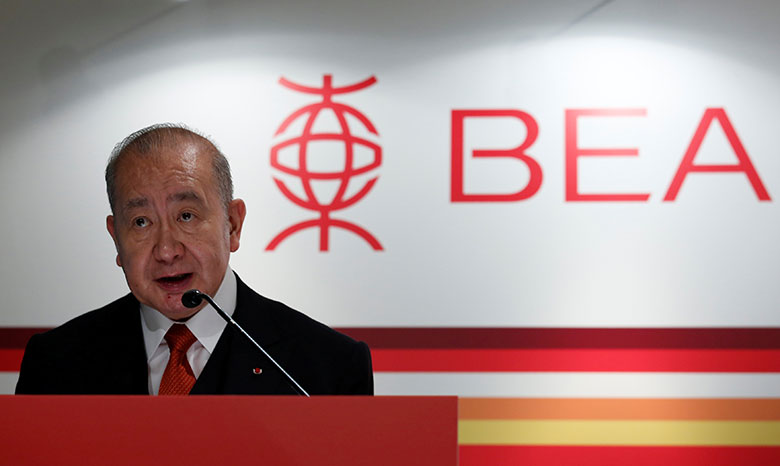David Li, chairman of Bank of East Asia
Elliott Management and Bank of East Asia (BEA) on Wednesday issued a joint press release, including comments from Elliott co-chief executive Jonathan Pollock and Bank of East Asia co-CEOs Adrian and Brian Li.
It said Goldman Sachs had been hired to do a “comprehensive review” of BEA’s portfolio and assets, and to look for “strategic transactions” that could boost its bottom line.
A status update on the review has been slated for June 30.
However, despite the dual announcement – the first of its kind, according to sources close to the bank – divisions seem as stark as ever.
Asked by Euromoneyif the bank would countenance BEA being broken up to unlock profit, a source says: “To be clear, the focus is not to break up the bank. Elliott Management knows that.”
However, people familiar with the situation at the New York-based hedge fund, which has an 8% stake in BEA, see things in a different light.
Outcomes
Like BEA, Elliott has no visibility on the review’s likely findings, given that it is still in its early stages and an independent exercise that could suggest outcomes acceptable to both parties, to one but not the other, and even to neither.
People with knowledge of the situation at the US firm say every eventuality is still in play, noting: “Our belief is this will be a real review, pursued with conviction [that could] include some quite significant transactions.
“We are not sure if [it will suggest] a break-up of the bank or not, but it is definitely on the table.”
A spokesman at Goldman Sachs declined to comment; sources close to BEA said the US bank had advised previously on the sale of non-core assets.
The rhetoric, while polite and measured, reinforces how crystallized positions are behind the scenes.
BEA, which in 2019 celebrated its 100th anniversary as a lending institution, believes it has changed plenty, and has never been ardently receptive to Elliott’s proactive – some might say rugged – operating style.
David Li, who still owns 3.44% of a bank founded by his great uncle, stepped down last year as CEO to be replaced by his two sons, but remains chairman.
Under Adrian and Brian, the bank continues to invest in digital, remodel jaded branches and trim its roster of mainland branches, which now stands at 98. BEA’s largest shareholders are Japan’s SMBC, with a 17.5% stake, and Spain’s CaixaBank, with a stake of 16%.
However, Elliott’s view that BEA has chronically underperformed is impossible to refute. Profit slumped 50% year-on-year in 2019, to HK$3.26 billion ($420 million), the lowest level since 2009, while its shares have been on a downward trajectory for two and a half years.
Were BEA to be put up for sale, there would be plenty of interest from investors keen to buy the bank’s assets and operations in Hong Kong, or in the mainland, or in both
In China, the foundation of its future business, losses hit HK$3.55 billion, as provisions for bad loans surged. The bank immediately announced plans to re-organize its mainland business, by slashing lending to clients in second-tier cities.
Sources close to BEA pointed to renewed “trust and dialogue” and a “willingness to work together to reach an agreement that everyone is happy with [and which will] cause us to eliminate litigation”.
That statement refers to a seven-week hearing slated to take place in a Hong Kong court in early May, the latest development in a five-year legal tussle instigated by Elliott, to put Hong Kong’s last remaining family-controlled lender under new management.
The source said the review was the bank’s own decision, adding it was “a positive that Elliott Management is saying ‘let’s support this now’”, but others familiar with the situation said it was “no surprise [the review] is being announced on the eve of the court case”.
The US firm was keen to point out that litigation proceedings against BEA have been paused – but not withdrawn.
What lies ahead? A clue may be in a research note published on Wednesday by Citi. It said “all options” are now open, including “potentially divesting [the bank’s] Hong Kong or China operations or both”.
It framed three possible outcomes: a sale of BEA’s China business; separate divestments of its Hong Kong and mainland units; and simply putting the entire bank up for sale.
Citi said the second option could offer the highest sales multiple and push the stock to HK$26.4 a share, from HK$17.6 at close of trading on Wednesday.
Profitable
With the focus for so long on the power play between the Li family and Elliott, a simple fact goes overlooked.
Yes, BEA is in a tough spot, squeezed by expectant and activist investors, and buffeted in its heartland by a slowing China economy, a deadly pathogen, and a city that spent much of 2019 being torn apart by protesters.
However, it is still a profitable lending institution with a notable presence in the world’s second-largest economy and in Asia’s chief financial hub, a claim that can only be made by China’s big state banks, and a handful of universal lenders, such as HSBC.
Were BEA to be put up for sale, there would be plenty of interest from investors keen to buy the bank’s assets and operations in Hong Kong, or in the mainland, or in both.
It is a prized asset, and one worth fighting for.


 Signal2forex.com - Best Forex robots and signals
Signal2forex.com - Best Forex robots and signals




